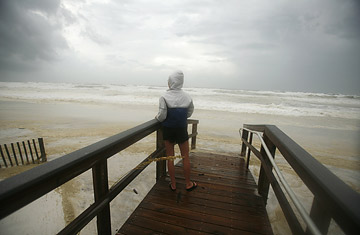
Ann Kirk watches the heavy surf on Pensacola Beach, Florida, early Monday, Sept. 1, 2008 as Hurricane Gustav approaches the Gulf Coast.
After the 2000 presidential election debacle, a friend of mine in New York voiced a snide but widely shared sentiment: "The best thing about Florida," he told me, "is that it's a place to keep Floridians."
I've often said the same thing about Manhattan. But I'm recalling my friend's remark now as I look east and see hurricanes lining up in the Atlantic like bombers on an aircraft carrier, threatening to blow mango trees into my Miami living room from now until Halloween. After that air assault, of course, shock troops from the insurance industry will attack the peninsula with premium increases outrageous enough to make sub-prime adjustable-rate mortgages look ethical.
Then, as recent trends indicate, cash-strapped Floridians will start to leave. And move north. Perhaps into your state. Perhaps into your town.
Which is why, America, you and your congressman better start thinking seriously about a national catastrophe fund.
Yes, as a native Midwesterner I once felt the way many do — that people who choose to live in high-risk areas like South Florida deserve about as much sympathy as gamblers who run up mafia debts. And I'm just as aware that I sound like a hypocrite changing my views simply because I changed my zip code. Then again, mine is hardly the only double standard. Building a house smack on the bank of a river in Iowa doesn't look much smarter today than living on one of the Florida Keys (See photos of the Iowa floods here); yet the same river dwellers who grouse about the ocean dwellers have had federally subsidized flood insurance for 40 years. Either way, the bottom line is that during the hurricane lull of the last quarter century, our ever-prescient government leaders looked the other way as half of all Americans crowded into coastal counties. Sure, exorbitant windstorm premiums are one way to halt that trend. Still, now that we're entering what scientists call a more active hurricane era, reality dictates that we come up with a smarter way to absorb the costs not just of storm damage but all global-warming induced headaches, from longer droughts to heavier rains.
To many, that solution is the federal "cat" fund, which would act as a backstop for the natural catastrophe insurance programs in states like Florida. Proponents insist it would protect heartland as well as coastal homeowners by spreading natural disaster risk across the country and thereby reducing the cost of insurance (private and public) generally — especially since communities and homeowners that benefit would be required to follow smarter development and storm protection codes in return. They also argue it would save taxpayers in the end by reducing the amount of emergency relief money state and local governments must throw around after disasters hit. Opponents, including President Bush, say it would be an unwise disruption of the private insurance markets and force taxpayers in low-risk regions to subsidize insurance for those in more dangerous zones. Despite widespread calls for the fund after Hurricane Katrina left as much as $80 billion in damage in 2005, the idea is still idling on Capitol Hill as a congressional commission studies it. (See photos of Hurricane Katrina's damage here).
Perhaps then the prospect of a frightening demographic reversal might get constituents to call Washington. As TIME has reported in recent years, Florida, once the greatest population magnet since California, is for the first time beginning to feel a net migration out of the state. Extensive interviews with families moving north indicate that the Sunshine State's ballooning costs of living — especially windstorm premiums, which in some cases were rising in South Florida by as much as 100% a year until Governor Charlie Crist stepped in last year with a temporary rate freeze — are the major reason.
But these Floridians almost always express another reason for leaving: Floridians themselves. It's not just the anti-intellectual, sun-addled carelessness that was so prominently on display in 2000 and is still showcased in our abysmal school systems, reckless development and feckless transit infrastructure. Floridians, especially South Floridians, are consistently ranked as America's rudest drivers. Miami-Dade County is so corrupt that a developer can admit to having pocketed most of the $1 million in government funds he received to build desperately needed affordable housing and still only get probation, as was the result in one case this summer. And don't get me started on all the mirrored walls my wife and I encountered when we were shopping for a house here.
So let me make this as simple as possible: Hand over the cat fund and we Floridians will stay put, folks. Otherwise, we're leaving Paradise for Peoria. Get ready for butterfly ballots and jerks in flip-flops making right turns from far left lanes. I'm serious — we're as obnoxious as New Yorkers without the work ethic. Give us the cat fund, America, or we'll panel your walls with mirrors.
